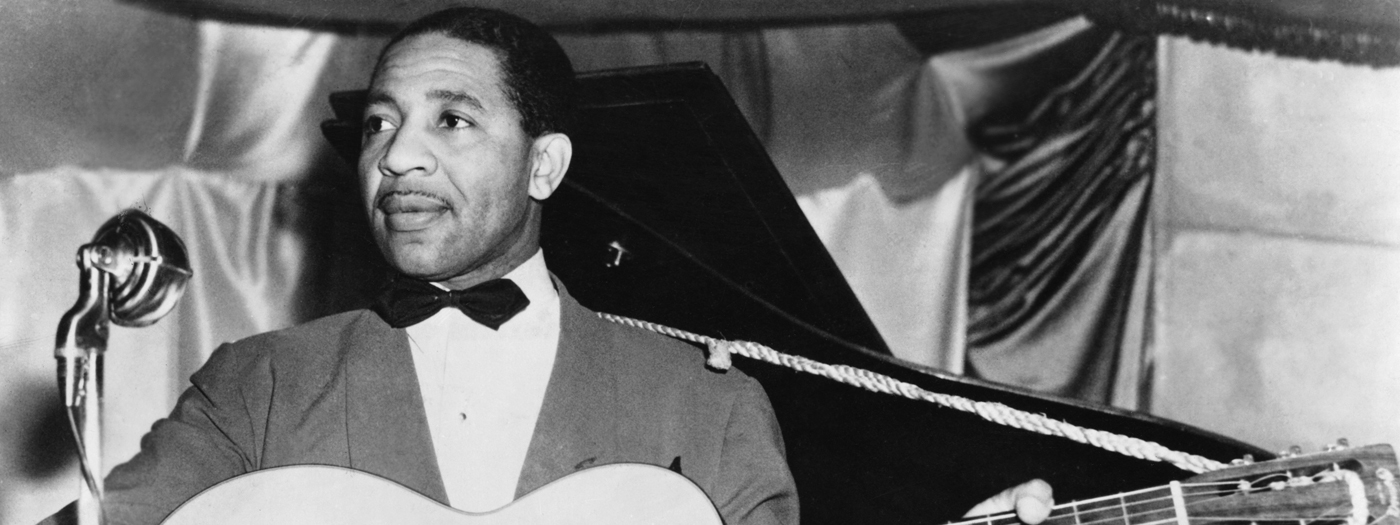Overview as a Music Artist and His Impact
Lonnie Johnson (1899–1970) was an American blues and jazz guitarist, singer, and songwriter who played a significant role in the development of both genres. Known for his innovative guitar work, Johnson was one of the most influential musicians of the early 20th century. His pioneering techniques, especially his single-string soloing, laid the groundwork for modern electric blues and jazz guitar.
Early Life and Career
Alonzo “Lonnie” Johnson was born on February 8, 1899, in New Orleans, Louisiana, into a musical family. He was exposed to music at a young age, learning to play the violin, mandolin, and guitar. His early years in New Orleans, a city rich with musical traditions, greatly influenced his development as a musician.
Johnson’s professional music career began in the 1920s after he moved to St. Louis, Missouri. He won a blues contest sponsored by Okeh Records in 1925, which led to his first recording session. This marked the beginning of his prolific recording career, which spanned several decades and produced over 130 recordings for various labels, including Okeh, Bluebird, and Decca.
Musical Innovations and Style
Lonnie Johnson was known for his versatility, able to perform blues, jazz, and pop music with equal skill. However, his most significant contribution to music was his guitar playing. Unlike many of his contemporaries who focused on rhythm guitar, Johnson was a pioneer in playing single-string guitar solos, a technique that would later become a hallmark of modern blues and rock guitarists.
- Blues and Jazz Crossover: Johnson’s ability to bridge the gap between blues and jazz made him a unique figure in American music. His work in the late 1920s and 1930s with artists like Louis Armstrong, Duke Ellington, and Eddie Lang (with whom he recorded the groundbreaking “Guitar Blues” and “Guitar Rag”) showcased his ability to blend the improvisational aspects of jazz with the emotional expressiveness of the blues.
- Influence on Guitar Technique: Johnson’s single-string soloing style was revolutionary at the time and influenced a wide range of guitarists, including T-Bone Walker, B.B. King, and Charlie Christian. His technique prefigured the lead guitar style that became central to rock and roll.
Career Highlights
- Recordings: Johnson’s vast catalog includes classic tracks like “Tomorrow Night,” “Careless Love,” and “Jelly Roll Baker.” His recordings from the 1920s to the 1940s are considered some of the finest examples of early blues and jazz guitar playing.
- Collaboration with Eddie Lang: Johnson’s recordings with white jazz guitarist Eddie Lang were among the first interracial recordings in American music history. Their duets, particularly “Guitar Blues” and “Guitar Rag,” were instrumental in popularizing the guitar as a lead instrument in both blues and jazz.
- Later Career and Revival: After a decline in popularity in the 1940s and 1950s, Johnson experienced a revival in the 1960s during the folk and blues revival. He recorded several albums during this period, including “Blues, Ballads, and Jumpin’ Jazz,” which reintroduced him to a new generation of listeners.
Lonnie Johnson – Favs – Playlist:
Impact and Legacy
Lonnie Johnson’s impact on music is profound, particularly in the development of blues and jazz guitar techniques. His innovative approach to guitar playing influenced countless musicians and helped shape the sound of 20th-century American music.
- Influence on Modern Blues and Rock: Johnson’s single-string solos laid the groundwork for modern blues guitarists like B.B. King and Eric Clapton. His blending of blues and jazz elements can be seen as a precursor to the crossover styles that would dominate the music scene in the mid-20th century.
- Cultural and Racial Milestones: Johnson was one of the first black musicians to record with white musicians, breaking racial barriers in the music industry. His collaborations with Eddie Lang were particularly significant in this regard.
- Recognition and Honors: Despite his significant contributions, Johnson did not receive widespread recognition during his lifetime. However, in the years following his death, his work has been celebrated by blues and jazz historians, and he is now regarded as one of the most important guitarists in the history of American music.
References
- AllMusic – Lonnie Johnson Biography: Provides an in-depth overview of Lonnie Johnson’s career and musical contributions.
- PBS – Lonnie Johnson: Blues and Jazz Pioneer: Discusses Johnson’s role in the development of blues and jazz and his influence on later musicians.
- Rock and Roll Hall of Fame – Lonnie Johnson’s Influence: Explores Johnson’s impact on rock and roll guitarists and his legacy in American music.
- The Blues Foundation – Lonnie Johnson’s Legacy: Provides information on Johnson’s induction into the Blues Hall of Fame and his lasting impact on the genre.


Leave a Reply